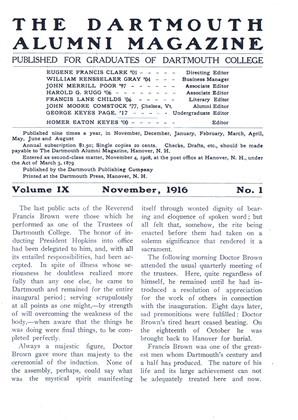I have said that the college exists as means to! an end, and that the end should be constructive idealism interpreted in terms of service. It well may be added that no particular form of service is so vitally essential today as high-minded consecration to the needs of the state. The development of our national life has been shown to be far short of the standard to which it was supposed to have attained, and in many of our attributes we have been proved more a group of peoples than a nation. It remains for the living of our time as truly as for those of the generation of half a century ago to be dedicated to the great task remaining before us, of developing unity and forcefulness of conviction in our national life, that, from the heritage of the past and the needs of the future alike, we take increased devotion to the cause for which such sacrifices have been made and in the success of which we firmly believe humanity to be so much concerned.
To this endeavor the colleges should be committed by their every instinct and by all the influences which have shaped them; and solemn responsibility rests upon them now that they shall be sensitive to the new note which is beginning to sound in our national affairs, as parochialism becomes less and less a characteristic, and as we come to recognize our inevitable responsibility among the nations of the earth.
The period before us will demand clearly defined national consciousness a.nd forceful leadership of rarest sort if we are to be important agents in the world's trend towards democracy. Mental processes must be clarified and thinking must be less muddled. It will not be a time when the destructive genius of critical analysis will be of maximum worth; and the necessity will exist that the susceptibility of modern college life to this process of thought shall give place to a genuine passion for constructive thinking and constructive planning, which is the only motive under which truly great things are ventured and done. Montaigne's statement still has point,—"The discharge of a present evil is no cure, if there be not general amendment of condition. * * * Whoever proposes only to remove that which offends him falls short; for good does not necessarily succeed evil; another evil may succeed, and a worse."
 View Full Issue
View Full Issue
More From This Issue
-
 Article
ArticleThe last public acts of the Reverend Francis Brown
November 1916 -
 Class Notes
Class NotesCLASS OF 1912
November 1916 By Conrad E. Snow -
 Class Notes
Class NotesCLASS OF 1912
November 1916 By Conrad E. Snow -
 Class Notes
Class NotesCLASS OF 1912
November 1916 By Conrad E. Snow -
 Class Notes
Class NotesCLASS OF 1910
November 1916 By Sturgis Pishon -
 Class Notes
Class NotesCLASS OF 1910
November 1916 By Sturgis Pishon







